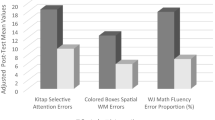Abstract
Children with neurodevelopmental disorders have executive function deficits that can interfere with their academic performance and school adaptation. The use of computerized training programs has proven to be useful to improve executive functions, as well as reading and math performance. We developed a digital game for assessing and improving sustained attention in children aged between 6 and 9 years with neurodevelopmental disorders. The game was developed based on a standardized task called Continuous Performance Test. This study aims to investigate teachers’ acceptability of the game and their perception and feedback in regard to different aspects of the game. Nine teachers from a special school in Romania participated in a focus group and completed the reflection sheets after playing the game. Our results showed that the participants really enjoyed playing the game and considered it appropriate for children with neurodevelopmental disorders. Findings provide important contributions to the domains of gamified psychological assessment in children with neurodevelopmental disorders.
Access this chapter
Tax calculation will be finalised at checkout
Purchases are for personal use only
Similar content being viewed by others
References
Chien, Y.L., Gau, S.F., Shang, C.Y., Chiu, Y.N., Tsai, W.C., Wu, Y.Y.: Visual memory and sustained attention impairment in youths with autism spectrum disorders. Psychol. Med. 45(11), 2263–2273 (2015)
Chien, Y.L., Gau, S.S.F., Chiu, Y.N., Tsai, W.C., Shang, C.Y., Wu, Y.Y.: Impaired sustained attention, focused attention, and vigilance in youths with autistic disorder and Asperger’s disorder. Res. Autism Spect. Disord. 8(7), 881–889 (2014)
Zelazo, P.D., Carlson, S.M.: Reconciling the context-dependency and domain-generality of executive function skills from a developmental systems perspective. J. Cognit. Dev., 1–19 (2022)
Stevens, C., Bavelier, D.: The role of selective attention on academic foundations: a cognitive neuroscience perspective. Dev. Cognit. Neurosci. 2, S30–S48 (2012)
Bull, R., Scerif, G.: Executive functioning as a predictor of children’s mathematics ability: inhibition, switching, and working memory. Dev. Neuropsychol. 19(3), 273–293 (2001)
May, T., Rinehart, N., Wilding, J., Cornish, K.: The role of attention in the academic attainment of children with autism spectrum disorder. J. Autism Dev. Disord. 43(9), 2147–2158 (2013)
May, T., Rinehart, N.J., Wilding, J., Cornish, K.: Attention and basic literacy and numeracy in children with autism spectrum disorder: a one-year follow-up study. Res. Autism Spect. Disord. 9, 193–201 (2015)
Jacob, R., Parkinson, J.: The potential for school-based interventions that target executive function to improve academic achievement: a review. Rev. Educ. Res. 85(4), 512–552 (2015)
Shalev, L., Tsal, Y., Mevorach, C.: Computerized progressive attentional training (CPAT) program: effective direct intervention for children with ADHD. Child Neuropsychol. 13(4), 382–388 (2007). https://doi.org/10.1080/09297040600770787
Rosvold, H.E., Mirsky, A.F., Sarason, I., Bransome, E.D., Beck, L.H.: A continuous performance test of brain damage. J. Consult. Psychol. 20, 343–350.1 (1956)
Spaniol, M.M., Shalev, L., Kossyvaki, L., Mevorach, C.: Attention training in autism as a potential approach to improving academic performance: a school-based pilot study. J. Autism Dev. Disord. 48, 592–610 (2018)
Ren, X., Wu, Q., Cui, N., Zhao, J., Bi, H.-Y.: Effectiveness of digital game-based training in children with neurodevelopmental disorders: a meta-analysis. Res. Dev. Disabil., 133, 104418 (2023)
World Medical Association: Ethical principles for medical research involving human subjects. Clin. Rev. Educ. 310(20), 2191–2194 (2013). https://www.wma.net/wp-content/uploads/2016/11/DoH-Oct2013-JAMA.pdf
Tomczyk, S., Barth, S., Schmidt, S., Muehlan, H.: Utilizing health behaviour change and technology acceptance models to predict the adoption of COVID-19 contact tracing apps: cross-sectional survey study. J. Med. Internet Search 23(5), e25447 (2021)
Adam, M.T., Gregor, S., Hevner, A., Morana, S.: Design science research methods in human-computer interaction projects. AIS Trans. Hum. Comput. Interact. 13(1), 1–11 (2021)
Shortall, R., Itten, A., van der Meer, M., Murukannaiah, P.K., Jonker, C.M.: Reason against the machine: Future directions for mass online deliberation (2021). arXiv. https://arxiv.org/abs/2107.12711
Forni, D.: Horizon zero dawn: the educational influence of video games in counteracting gender stereotypes. Trans. Digit. Games Res. Assoc. 5(1), 77–105 (2020)
Mehta, A., Bond, J.L., Sankar, C.S.: Developing an inclusive education game using a design science research Gestalt method. AIS Trans. Hum. Comput. Interact. 14(4), 523–547 (2022)
Mazon, C., Fage, C., Sauzéon, H.: Effectiveness and usability of technology-based interventions for children and adolescents with ASD: a systematic review of reliability, consistency, generalization and durability related to the effects of intervention. Comput. Hum. Behav. 93 (2019). https://doi.org/10.1016/j.chb.2018.12.001
Acknowledgements
The research leading to these results is in the frame of the “EMPOWER. Design and evaluation of technological support tools to empower stakeholders in digital education” project, which has received funding from the European Union’s Horizon Europe programme under grant agreement No 101060918. Views and opinions expressed are however those of the authors(s) only and do not necessarily reflect those of the European Union. Neither the European Union nor the granting authority can be held responsible for them.”
Author information
Authors and Affiliations
Corresponding author
Editor information
Editors and Affiliations
Rights and permissions
Copyright information
© 2023 The Author(s), under exclusive license to Springer Nature Switzerland AG
About this paper
Cite this paper
Costescu, C. et al. (2023). Mushroom Hunters: A Digital Game for Assessing and Training Sustained Attention in Children with Neurodevelopmental Disorders. In: Kubincová, Z., Caruso, F., Kim, Te., Ivanova, M., Lancia, L., Pellegrino, M.A. (eds) Methodologies and Intelligent Systems for Technology Enhanced Learning, Workshops - 13th International Conference. MIS4TEL 2023. Lecture Notes in Networks and Systems, vol 769. Springer, Cham. https://doi.org/10.1007/978-3-031-42134-1_8
Download citation
DOI: https://doi.org/10.1007/978-3-031-42134-1_8
Published:
Publisher Name: Springer, Cham
Print ISBN: 978-3-031-42133-4
Online ISBN: 978-3-031-42134-1
eBook Packages: Intelligent Technologies and RoboticsIntelligent Technologies and Robotics (R0)




